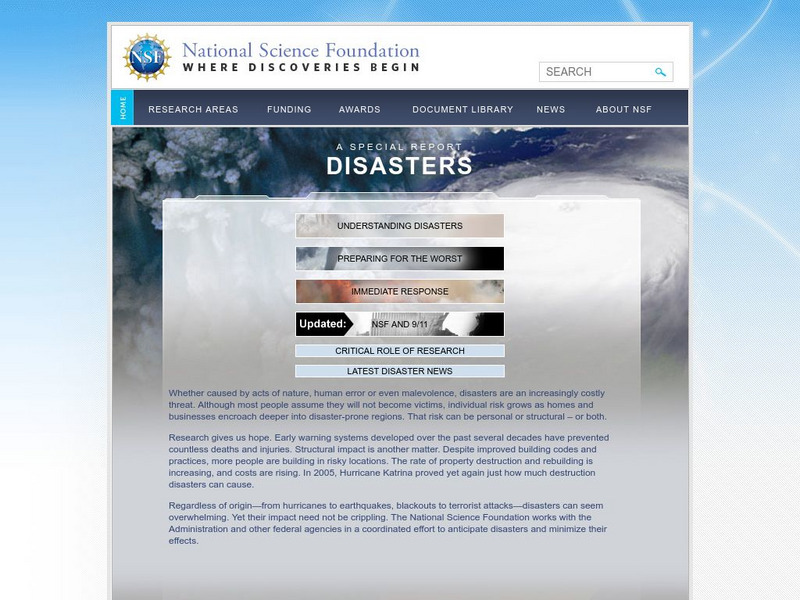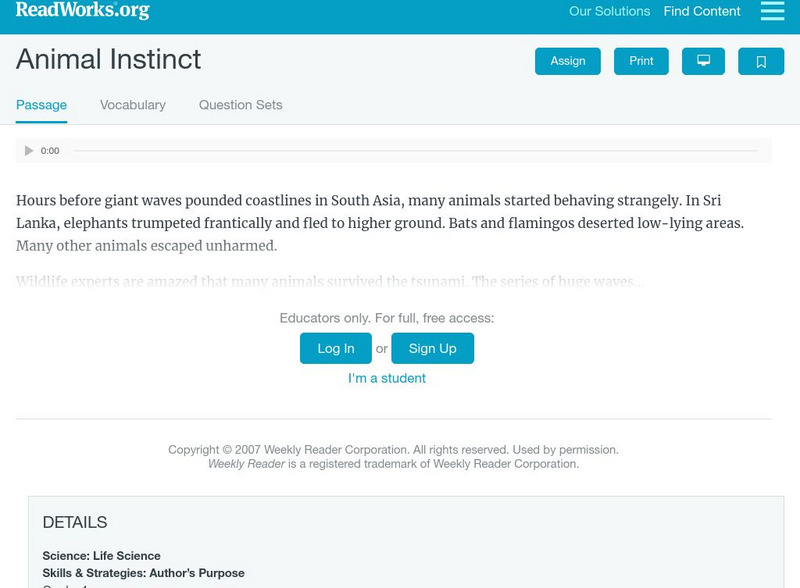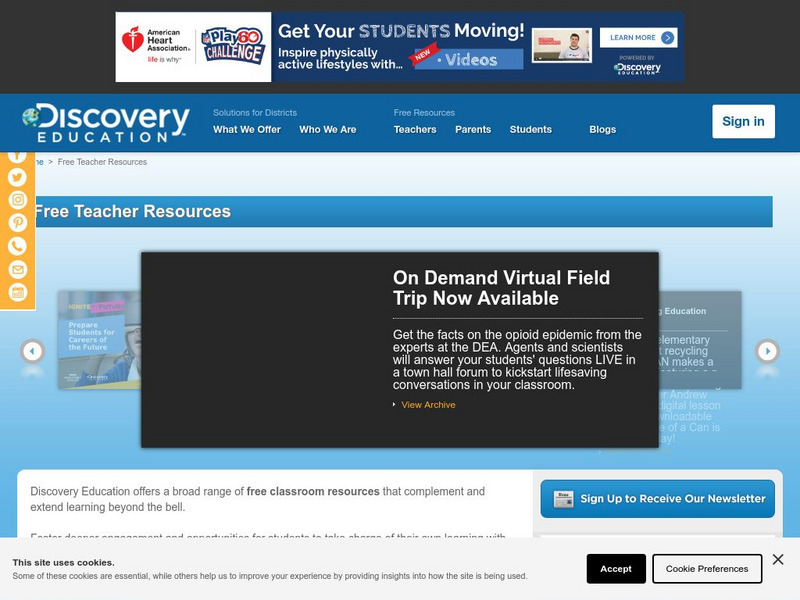Curated OER
The Chaos Game
Young scholars measure and predict the behavior of a fractal. In this investigative lesson students divide into groups, and participate in an activity that includes drawing triangles and coloring vertices.
Science Struck
Science Struck: 15 Worst Natural Disasters in History of u.s.
Presents a list of the fifteen worst natural disasters to strike the United States and its territories, along with descriptions, year, number of casualties, cost, and where each occurred.
Science Struck
Science Struck: A Complete List of Natural Disasters
Explains what a natural disaster is and provides a list of every type along with a short description of each.
Science Struck
Science Struck: 19 Worst Natural Disasters in the History of Japan
Presents a list of the nineteen worst natural disasters to strike Japan, along with descriptions, year, number of casualties, and where each occurred. Japan has been hit by earthquakes, tsunamis, volcanic eruptions, typhoons, blizzards,...
Science Struck
Science Struck: Worst Natural Disasters
Presents charts listing the fatalities from various disasters around the world, including epidemics, plague, famine, weather-related and earth-related disasters going back hundreds of years. Next, the top ten disasters with the highest...
National Science Foundation
National Science Foundation: Disasters
The National Science Foundation provides us with a comprehensive report on disasters; understanding them, how to prepare for them, responding to them, and the latest news. Learn about the risks involved and how to minimize the effects.
Scholastic
Scholastic: Severe Weather and Natural Disasters
Learn about severe weather and natural disasters through experiments, witness accounts, vocabulary, and much more.
Other
Hurricane Science: Hurricanes: Science and Society: Galveston 1900
Article on the science of hurricanes and the effect on society, featuring Galveston, 1900. With map, list of facts and embedded links to vocabulary and related material.
Read Works
Read Works: Preparing for a Disaster
[Free Registration/Login Required] An informational text about how to stay safe during different types of natural disasters. A question sheet is available to help students build skills in reading comprehension.
Burke Museum
Burke Museum: Earthquake Science
This section of the Burke Museum's online exhibit on earthquakes and natural disasters focuses on the science of earthquakes. Topics that are covered include plate motion, heat, interior of the earth, and more.
Burke Museum
Burke Museum: The Big One
This is the introduction to the Burke Museum's online exhibit on earthquakes and natural disasters. This is part of the Burke Museum's collection of geology. Topics that are covered include an introduction to quakes, quake science, quake...
TeachEngineering
Teach Engineering: Survive That Tsunami!
Students use a table-top-sized tsunami generator to observe the formation and devastation of a tsunami. They see how a tsunami moves across the ocean and what happens when it reaches the continental shelf. Students make villages of model...
Science Buddies
Science Buddies: Build an Earthquake Resistant House
For this project, students will build model earthquake-resistant buildings and measure their movement during a simulated earthquake using a mobile phone and a sensor app.
BBC
Bbc News: Science and Environment: How Earthquakes Happen
This site uses a series of animations to give an overview of earthquake types and their causes. This colorful site is accompanied by brief descriptions. Additional animations of other natural disasters are featured on the right side of...
Read Works
Read Works: Animal Instinct
[Free Registration/Login Required] Students read about animals that seem to instinctively know when a natural disaster is about to happen. A question sheet is available to help students build skills in author's purpose.
American Geosciences Institute
American Geosciences Institute: Earth Science Week: Where Growth Meets Growth
Students identify fire risk factors for a property located near a wildland area.
CK-12 Foundation
Ck 12: Second Grade Science: Earthquakes
[Free Registration/Login may be required to access all resource tools.] Discusses how changes over time can lead to events such as earthquakes.
Woods Hole Oceanographic Institution
Woods Hole Oceanographic Institution: Tsunami: An Interactive Guide
A complete, interactive learning activity covering the science of tsunamis, preparedness, research, and historical tsunamis. Excellent animations and real, historical recordings of survivors allow the learner to experience what happens...
Science Struck
Science Struck: Examples of Destructive Forces of Nature
Discusses the destructive forces unleashed by volcanic eruptions, and the movement of water, wind, ice, and tectonic plates.
Science Struck
Science Struck: Examples of Constructive Forces of Nature
Discusses the constructive forces resulting from volcanic eruptions and the movement of water, wind, ice, and tectonic plates.
Columbia University
Scientific Background on the Indian Ocean Earthquake and Tsunami
This site features information and related links that can be used by students and scientists to understand the events that led to the December 2004 Indian Ocean tsunami.
Discovery Education
Discovery Education: Understanding Tsunamis
Come and learn more about the devastating effects of tsunamis. This site features video segments revealing the devastation tsunamis can cause and how tsunamis are formed.
American Geosciences Institute
American Geosciences Institute: Earth Science Week: Sinkholes in a Cup
Students simulate a sinkhole, and discover the geological catalysts that happen beofore sinkholes occur.
CK-12 Foundation
Ck 12: Earth Science: Heat Waves and Droughts
[Free Registration/Login may be required to access all resource tools.] Describes the causes and effects of heat waves and droughts.

















